| "YYZ" | ||||
|---|---|---|---|---|
| Instrumental by Rush | ||||
| from the album Moving Pictures | ||||
| Released | February 12, 1981 | |||
| Recorded | 1980 | |||
| Genre | ||||
| Length | 4:25 | |||
| Label | Mercury | |||
| Songwriter(s) | ||||
| Producer(s) |
| |||
| Rush instrumental chronology | ||||
| ||||
| Audio sample | ||||
| Music video | ||||
| "YYZ" on YouTube | ||||
"YYZ" (natively pronounced wye-wye-zed) is an instrumental rock composition by the Canadian rock band Rush from their 1981 album Moving Pictures . The live album Exit... Stage Left (1981) and the concert video recording A Show of Hands (1989) both include versions in which Neil Peart incorporates a drum solo –as an interlude on the former,and as a segue out of the piece on the latter. [2] [3]
YYZ is the IATA airport identification code of Toronto Pearson International Airport,near Rush's hometown. The band was introduced to the rhythm as Alex Lifeson flew them into the airport. A VHF omnidirectional range system at the airport broadcasts the YYZ identifier code in Morse code. Peart said in interviews later that the rhythm stuck with them. [4] Peart and Geddy Lee have both said "It's always a happy day when YYZ appears on our luggage tags." [5]
The piece's introduction,played in a time signature of 10
8,repeatedly renders "Y-Y-Z" in Morse Code using various musical arrangements. [6] [7]
| "YYZ" rendered in Morse code | ||
|---|---|---|
| Y | Y | Z |
| - . - - | - . - - | - - . . |
An official animated music video was released on YouTube on March 11,2022 to coincide with the release of the 40th anniversary edition of Moving Pictures. The video contains elements from the parent album cover,and depicts a heist in Toronto. It also contains various easter eggs referencing Rush's other work,such as a fast food chain named Fried by Night,based on their album Fly by Night .
The recording of YYZ took place at Le Studio in Morin-Heights,Quebec,in the summer of 1980. [8] The rhythm of the song is inspired by a IATA airport identification code of Toronto Pearson International Airport,thought of by Neil Peart,who recalls:
"The rhythm stuck in my head and I said, ‘Guys!’ So then, thematically we said, ‘We’ll let’s use that airport — so much a part of our lives in those days and after — let’s use that as a metaphor in a sense. Again, in a playful way. There was no sense of ‘Okay, this part is this part’ and all that. But there is a sense of bustling and coming and going and the grand emotion of that middle section of what airports can be. In our lives, airports were rich with symbolism. Departures and comings and goings; departures and arrivals. Separations and meetings. That was kind of woven into the song. The exotic nature of travel, too, and Alex’s guitar solo for sure too. He wove in that kind of eastern mode." [9]
Neil Peart’s used the crotales for the Morse code-inspired rhythm. The crashing noise heard between the breaks in the guitar solo are the sound of windchimes tied to a 2x4 plywood sheet slapped against a wood table. [10]
"YYZ" was nominated for a Grammy in the Best Rock Instrumental category in 1982. It lost to "Behind My Camel" by The Police, from their album Zenyatta Mondatta . [11]

Neil Ellwood Peart was a Canadian and American musician, known as the drummer and primary lyricist of the rock band Rush. He was known to fans by the nickname 'The Professor', derived from the Gilligan's Island character of the same name. His drumming was renowned for its technical proficiency and his live performances for their exacting nature and stamina. Peart earned numerous awards for his musical performances, including an induction into the Modern Drummer Readers Poll Hall of Fame in 1983 at the age of thirty, making him the youngest person ever so honoured.

Rush was a Canadian rock band formed in Toronto in 1968 that primarily comprised Geddy Lee, Alex Lifeson (guitar) and Neil Peart. The band's original line-up comprised Lifeson, drummer John Rutsey, and bassist and vocalist Jeff Jones, whom Lee immediately replaced. After Lee joined, the band went through a few line-up changes before arriving at its classic power trio line-up with the addition of Peart in July 1974, who replaced Rutsey four months after the release of their self-titled debut album; this line-up remained unchanged for the remainder of the band's career.
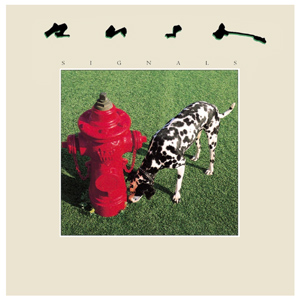
Signals is the ninth studio album by Canadian rock band Rush, released on September 9, 1982 by Anthem Records. After the release of their previous album, Moving Pictures, the band started to prepare material for a follow-up during soundchecks on their 1981 concert tour and during the mixing of their subsequent live album Exit...Stage Left. Signals demonstrates the group's continuing use of synthesizers, sequencers, and other electronic instrumentation. It is the last album produced by their longtime associate Terry Brown, who had worked with them since 1974.
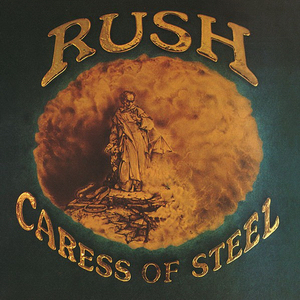
Caress of Steel is the third studio album by Canadian rock band Rush, released on September 24, 1975, by Mercury Records. It was recorded immediately after the band concluded touring in support of their previous album, Fly By Night, and marked a development in the group's sound, moving from the blues-based hard rock style of their debut towards progressive rock. Caress of Steel is considered Rush's first progressive rock album. Songs such as "The Necromancer" furthered Rush's advancement into narrative-driven, fantasy-based compositions, while "The Fountain of Lamneth" was their first prog-rock "epic" to span an entire side of vinyl. Other tracks like "Bastille Day" and "Lakeside Park" became staples of the band's live setlists.
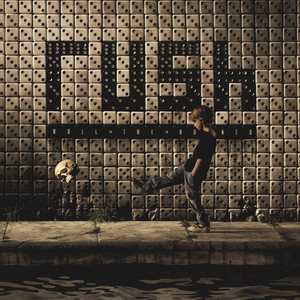
Roll the Bones is the fourteenth studio album by Canadian rock band Rush, released September 3, 1991, on Anthem Records. The band began working on the album after a brief creative hiatus following the tour promoting their previous release, Presto (1989).
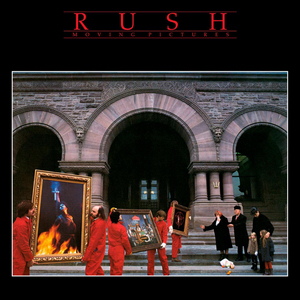
Moving Pictures is the eighth studio album by Canadian rock band Rush, released on February 12, 1981, by Anthem Records. After touring to support their previous album, Permanent Waves (1980), the band started to write and record new material in August 1980 with longtime co-producer Terry Brown. They continued to write songs with a more radio-friendly sound, featuring tighter and shorter song structures compared to their earlier albums.

Exit... Stage Left is the second live album by the Canadian rock band Rush, released as a double album in October 1981 by Anthem Records. After touring in support of their eighth studio album Moving Pictures (1981), the band gathered recordings made over the previous two years and constructed a live release from them with producer Terry Brown. The album features recordings from June 1980 on their Permanent Waves (1980) tour, and from 1981 on their Moving Pictures tour.

Counterparts is the fifteenth studio album by Canadian rock band Rush, released October 19, 1993, on Anthem Records. After the band finished touring its previous album Roll the Bones (1991) in mid-1992, the members took a break before starting work on a follow-up.

Different Stages is a live album by Canadian rock band Rush, released in 1998. The bulk of the first and second discs were recorded at the World Music Theatre in Tinley Park, Illinois, during the 1997 Test for Echo tour. Five other songs from various stops along the tour were included and three songs from the 1994 Counterparts tour. The third disc is taken from a performance at the Hammersmith Odeon in London during the A Farewell to Kings tour in 1978.

"The Spirit of Radio" is a song by Canadian rock band Rush, released from their 1980 album Permanent Waves. The song's name was inspired by Brampton, Ontario based radio station CFNY-FM's slogan. It was significant in the growing popularity of the band, becoming their first top 30 single in Canada and reaching number 51 on the US Billboard Hot 100.
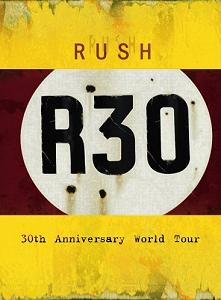
R30: 30th Anniversary World Tour is a live DVD by the Canadian rock band Rush, released on November 22, 2005 in Canada and the US, and November 28, 2005 in Europe. The DVD documents the band's R30: 30th Anniversary Tour, and was recorded on September 24, 2004 at the Festhalle Frankfurt, Germany.
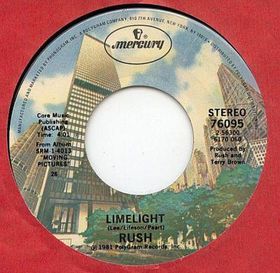
"Limelight" is a song by Canadian progressive rock band Rush. It first appeared on the 1981 album Moving Pictures. The song's lyrics were written by Neil Peart with music written by Geddy Lee and Alex Lifeson. "Limelight" expresses Peart's discomfort with Rush's success and the resulting attention from the public. The song paraphrases the opening lines of the "All the world's a stage" speech from William Shakespeare's play As You Like It. The band had previously used the phrase for its 1976 live album. The lyrics also refer to "the camera eye", the title of the song that follows on the Moving Pictures album.

The Snakes & Arrows Tour was a concert tour by Canadian rock band Rush to promote the studio album Snakes & Arrows. The first leg of the tour began on June 13, 2007, in Atlanta and concluded on October 29, 2007, at Hartwall Arena in Helsinki, Finland. The 2008 portion of the tour started on April 11, 2008, in San Juan, Puerto Rico at José Miguel Agrelot Coliseum and ended on July 24, 2008, in Noblesville, Indiana at the Verizon Wireless Amphitheatre. The tour was Rush's most successful to date, grossing nearly $65 million. At 114 shows, it is Rush's second-longest tour, after the Hemispheres tour back in 1978 –79.
The Test for Echo Tour was a concert tour by Canadian rock band Rush in support of their sixteenth studio album Test for Echo.
The Counterparts Tour was a concert tour by Canadian rock band Rush in support of their fifteenth studio album, Counterparts, and marked the members' 20th anniversary as a band.
The Roll the Bones Tour was a concert tour by Canadian rock band Rush in support of their fourteenth studio album Roll the Bones.
The R40 Live Tour was the final concert tour by Canadian rock band Rush that commemorated the 40th anniversary of drummer Neil Peart joining the band in July 1974. The title hearkens back to Rush's 2004 R30: 30th Anniversary Tour that celebrated the 30th anniversary of the band. The tour grossed US$37.8 million, with 442,337 tickets sold at 35 concerts. Although the tour was shorter than many of Rush’s preceding tours, it was very successful in terms of average concert attendance and gross, which was 12,638 and US$1,080,000 respectively. The tour also saw more sellouts than any other Rush tour in recent memory. With 26 out of the 33 reported shows being sellouts, and the remaining 7 still over 90% capacity, the band felt a taste of their success from their prime years again.
The Presto Tour was a concert tour by Canadian rock band Rush in support of their thirteenth studio album Presto.
The Exit... Stage Left Tour was a concert tour by Canadian rock band Rush, in support of the band's second live album Exit... Stage Left and its accompanying video.